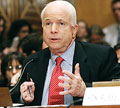 |
| Critic: McCain calls earmarks 'disgraceful.' |
Critics of projects and provisions that lawmakers insert in spending bills have their best chance in years to curb the practice, thanks to a drive to put restrictions on lobbyists. Observers think a ban on these earmarks isnt likely, but limits on such provisions, or more openness in drafting bills, may result.
The outcome could have a direct impact on where construction money goes, because many earmarks are for highways and other projects. Even so, contends Steve Hall, American Council of Engineering Companies vice president for government affairs, I still say that over all, from an industry perspective [earmark limits are] not necessarily a bad thing, because the moneys still going to get spent. The point of decision just changes. Instead of Congress, a state or local official would steer the dollars.
The most prominent critic, Sen. John McCain (R-Ariz.), says the Congressional Research Service calculated that the number of such provisions jumped from 4,126 in 1994 to 15,268 last year. Its disgraceful, this process, McCain told a Jan. 25 Homeland and Governmental Affairs Committee hearing. McCain and Sen. Tom Coburn (R-Okla.) say they plan to challenge future legislative earmarks that come to the Senate floor.
Jay Hansen, National Asphalt Pavement Association vice president for government affairs, says earmarks wont be eliminated. I just dont think thats realistic, he says. Adds another industry source: I cant imagine that [House Appropriations Chairman] Jerry Lewis or [Senate Appropriations Chairman] Thad Cochran are going to give up their right to determine who gets what money in the whole appropriations process.
Sen. Pete Domenici (R-N.M.) says he is an advocate of reforming the process. One possible target are mammoth, omnibus packages, which have drawn many late add-ons. Long-time Senate appropriator Robert Byrd (D-W.Va.), thinks Congress should make the spending calls. But he also calls the huge end-of-session bills a Frankenstein monster of the legislative process.
American Highway Users Alliance President Gregory Cohen says lawmakers may be required to identify their earmarks publicly, or spell them out in a bill, not its accompanying report. It has gotten a bit out of control, he says. The vast majority are worthy projects, but if corruption enters into it then we do face the risk of bad projects getting funded. We should make sure that the process isnt tainted.
| The agreement, in accordance with the Energy Policy Act signed last August, also outlines a process for comparing actual building performance to design targets. The agencies now have six months to incorporate the principles into policy and develop implementing guidelines. The TRB report predicts gains from a system that charges motorists directly for their road use. That would include variable-price toll expressways plus metering to levy fees based on miles driven. But metering �will require a sustained national effort,� it adds.
|


Post a comment to this article
Report Abusive Comment